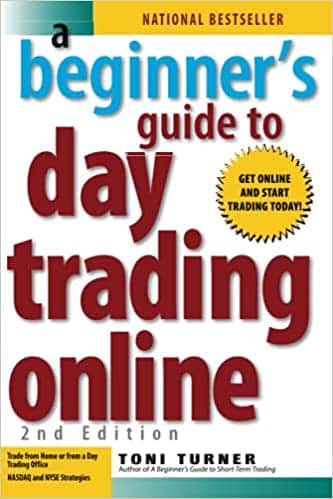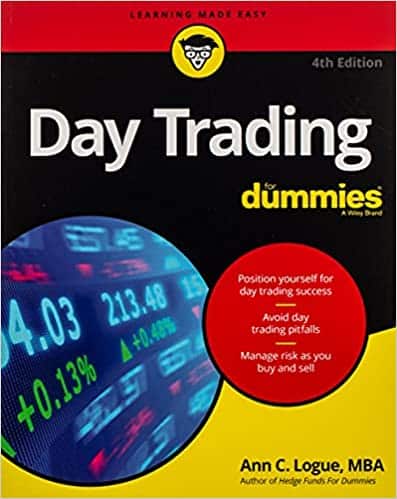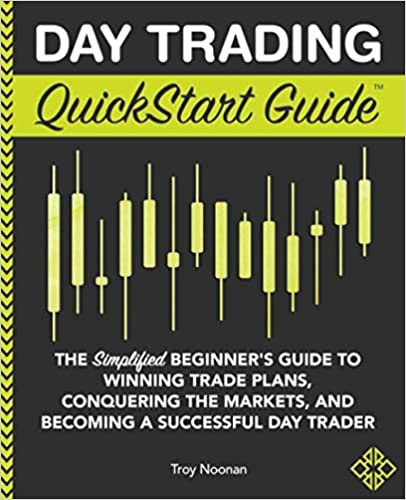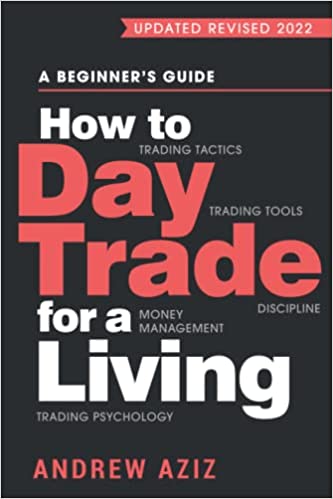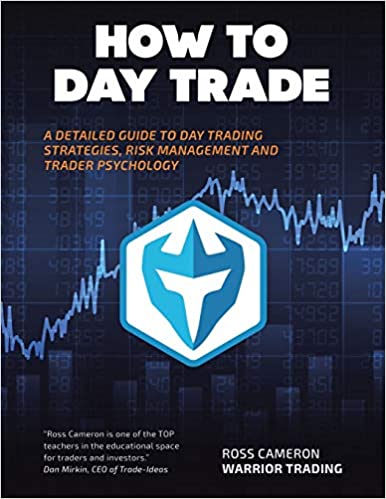Succeeding in day trading is quite easy if you have the necessary resources and tools. Day trading books are your first source of information before you can gain experience on your own. And we have just the best books for you.
Having the right information is key if you want to succeed in anything. Whether you are starting a business or advancing your career, you need to be well-equipped.
Day trading is not any different. And knowing the right books to read is crucial if you want to become a professional day trader. You need to have information, experiences, and tips from those who have done it before you and succeeded.
For this reason, we've dedicated this article to helping you identify the best day trading books to help fast-track your career. This way, you won't have to experiment independently but rather build from other people's experiences and expertise.
If you are ready to make it big in day trading, check out these day trading books for the best tips, strategies, and information about the changes in the financial market.
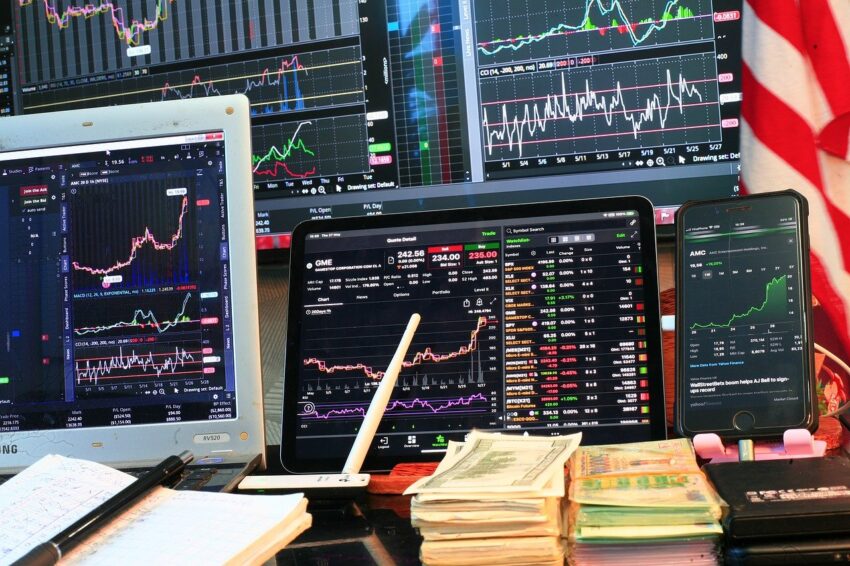
Table of Contents
How to Choose the Best Day Trading Books
Author Background
Before choosing a day trading book, make sure that you familiarize yourself with the author. It is important to buy a book written by a reputable author.
The author should at least be writing the book from experience. They should have a track record of their failures and wins. Books written by experts are the best, as you can be sure that they have skills and experience in the area.
Skill Level
The book that you choose should match your skill level. If you are looking for the best day trading books for beginners, stay away from books that focus on advanced day trading. Always start with a book that is easy to read so that you can grow your level over time.
Any field, including day trading, has some technical jargon, so the last thing you want is to choose a book that will be too difficult to read.
Practical and Actionable Lessons
A good day trading should offer actionable and practical lessons. It should not be a book based on theories and assumptions. By the time you finish reading the book, you should be able to start day trading by following the instructions in the book.
Therefore, before buying a book, go through the table of contents and see whether the lessons are practical and actionable.
Reading books authored by professionals who have mastered technical trading strategies is the best approach to gaining knowledge about how the financial markets move. In this article, I will recommend the best trading books to help you as a beginner, intermediate, and expert.
Beginners' Best Books for Trading
If you're ready to start trading, you might be confused by the complicated platforms, fees, charts, and patterns. There are a lot of resources around you that can get you started in the best possible way.
Invest in good beginner trading books written in a very simple, easy-to-understand format and provide detailed instructions on picking stocks, putting strategies into practice, and managing your capital and risk.
See Related: Can F1 Students invest in stocks.
1. A Beginner's Guide to Day Trading Online – Toni Turner
This book is ideal for beginners who want to learn how the day trading market works. The book is written by Toni Turner, an investor, and trader for the past fourteen years. With the change in financial markets, the author published the 2nd edition to keep up with the changing financial environment.
This is an easy-to-read book with a step-by-step guide to help you start day trading. It covers topics such as stock prices, new trading products such as ETFs, and insight into the new trader perspective.
See related: Best Indicators for Day Trading
2. Day Trading for Dummies – Ann C. Logue
Day Trading for Dummies is written by Ann C. Logue, a finance expert and a professional financial analyst. The book offers an action plan with the best tips to help you kick-start your day trading journey.
It even has a small cheat sheet you can go through before buying the book. The cheat sheet is like a summary of the book, giving you an overview of what the book entails.
In addition, the book helps you with the day trading lingo in case you are a beginner. This book will teach you about cryptocurrencies, regulations, risk management, and programming.
3. High Probability Trading: Take steps to Become a Successful Trader – Marcel Link
Michael Sincere, a seasoned trader, has distilled his understanding of the technical side of day trading to give new traders a good grasp of it and the ability to navigate the day trading process. The author uses patterns, indicators, and charts to break everything down into an understandable style so you can visualize the knowledge you are taking in.
The book also covers step-by-step guidance on starting as a first-time trader. Conversions with other successful traders in the book give you first-hand knowledge and information about the day trading world. Learning from their achievements and mistakes can help you avoid the dangers associated with day trading.
4. A beginners' Guide to the Stock Market: Everything You Need to Know to Start Making Money Today – Mathew R. Krater
The stock market can be very challenging for many people to navigate. Mathew R. Krater makes it a little easier to understand with his book A Beginner's Guide to the Stock Market: Everything You Need to Know to Start Making Money Today also explains how anyone can participate in it. He dissects what the stock market is, its importance, and how to navigate it.
Short and to the point, this book gives people insight into how the stock market operates rather than letting them gamble on equities and hope for the best. You will learn how to integrate into the stock market by understanding its ins and outs.
You will learn how to increase your financial security, purchase equities, produce passive income, and much more. The resources in this book are useful because they show you how to make wise, calculated stock market investments.
See Related: How to Build Wealth Like a Pro: incredible Ways
5. Day Trading Made Easy: A Simple Strategy for Day Trading Stocks – Mathew R. Krater
Day trading is not exactly easy, and we would all be rich if it were. However, if you invest the time necessary to study day trading and the instruments required, you will have a higher chance of financial success than others.
Matthew R. Kratter will walk through each phase of the day trading process in his book. This book from Mathew Krater is just as good for learning how to trade as a beginner as the one listed above.
You will learn from Krater how to buy stocks, realize profits, and get out of losing deals. Additionally, you will be taught how to find good stocks and do technical analysis of financial markets. In this book, every aspect of day trading is covered. It's simple to read and packed with useful information.
6. Day Trading: A Detailed Beginner's Guide to Start to Day Trade for a Living with the Best Tools – Andrew C. Larke
Money is a source of worry and concern for many people. Everyone aspires to financial independence and stability. By reading Andrew Clarke's book Day Trading: A Detailed Beginner's Guide to Start to Day Trade for a Living with the Best Tools, you can learn how to use the stock market to ensure financial security.
This book offers a comprehensive guide to the day trading industry for beginners. It can offer you day trading resources, risk management advice, trader psychology, and more. You will learn step-by-step advice on becoming a day trader, avoiding making huge stock market mistakes, and becoming a day trading expert in no time. Clarke transformed his knowledge of day trading into a book that is easy to read and apply as a beginner in your daily trading life.
7. Day Trading QuickStart Guide: The Simplified Beginner's Guide to Winning Trade Plans
Written by another professional trader and trading coach, this day trading quick start guide gives you the best foundation to start day trading. Troy Noonan has made this piece a bit unique from most other books, equipping it with free digital assets like a trade analyzer, indicator, calculator, and commission rebate that will help you to track your progress.
Using the book, you will learn how to trade first without using money, giving you a perfect place for practice. You will also learn risk management and how to protect your trades.
The book has lessons on derivative markets, trading psychology, and technical analysis. This is one of the best technical analysis books for day traders.
Best Books for Intermediate Traders
Once you've gained some day trading exposure and executed a few successful trades, you might want to explore books that detail daily trading techniques. The strategic books listed below are the ideal addition to your library.
8. Trading in the Zone: Master the Market with Confidence, Discipline, and a Winning Attitude – Mark Douglas
Day trading may be arduous and is sometimes a full-time profession for many. Focusing on the psychology of day trading is “Trading in the Zone: Master the Market with Confidence, Discipline, and a Winning Attitude” by Mark Douglas.
The book explores the factors that initially drew you to day trading and the mindset you must uphold to be a profitable, successful day trader. Day trading is quite risky. In his book, Mark Douglas demonstrates how to assess risk, manage risk, and respond to market gains and losses. It also teaches the psychology of day trading, which can motivate you to successfully keep going to trade long-term.
9. The Truth About Day Trading Stocks – by Josh DiPietro
I think by now, we have established how risky day trading is. It has the potential for enormous rewards as well as substantial losses. Josh DiPietro guides his book to help you comprehend what day trading entails.
It might be a useful book to read in conjunction with “Trading in the Zone” because the two together might help you understand the risks and how to handle them.
DiPietro shows how to determine your readiness for day trading in terms of experience and finances. He also discusses how to choose the best stocks, create stop-loss orders to prevent excessive losses, and what a bad trading day looks like.
See Related: Effective Tips to Practice Financial Discipline
10. Mastering the Trade – John F. Carter
John F. Carter is undoubtedly the best person to effectively and plainly explain the day to day of day trading because he has been actively trading for almost two decades. In Mastering the trade, Carter successfully explains the typical psychological pitfalls traders fall into, emphasizing how risky day trading can be when you trade without detailed knowledge and how psychological mechanisms can affect how the market changes. He does this with a dash of humor and in straightforward language.
You will benefit from this book's ideas, examples of trading plans, and insights into Carter's trading experiences. This book is a good resource for intermediate traders. In the end, Toni Turner's and Andrew Aziz's writings, as well as Mastering the Trade, are must-reads for successful day traders.
11. Interactive Day Trading – Ultimate Trading Guide: Satish Gaire
Interactive Day Trading: Ultimate Trading Guide by Satish Gaire is a good book if you're an intermediate-level trader who wishes to advance to the expert level. The book describes everything you need to trade excellently, including the technical aspects of trading, market fundamentals, a step-by-step day trading guide, and numerous stock trading methods.
It also features mock tests and video tutorials to help you navigate all the concepts. This book is backed with a lot of visual content and provides many illustrations in simple-to-grasp words and additional video courses to help you fully comprehend the topics discussed.
12. The Simple Strategy – Markus Heitkotter
Any book that simplifies day trading and its techniques is a hit, in my opinion. Markus Heitkotter, in the simple strategy, achieved this. The book is written in an easily digestible format while packing many stock trading tools.
If you desire information on day trading in forex, his book is frequently cited as the best way to go. It deserves appreciation because you will receive thorough and understandable directions regarding the numerous exit and entry rules you must abide by.
Additionally, he offers you advice on different software programs for day trading, which will increase your chances of trading successfully. It is fun to read and has a lighthearted tone that will keep you glued to the pages. However, before reading this book, you should at least be an intermediate-level trader.
See Related: Best Books on Financial Independence
13. Range Trading – Michael Young
Michael Young's “Range Trading” is your best pick for a book that will give you specific information on day trading strategy. The book explores using more sophisticated methods, like scalping struggle, to get around exorbitant intraday charges.
Young delves into range trading, a different tactic that can result in better day trading. He simplifies these complicated techniques and presents them in simple terms so traders of intermediate levels can understand them.
Best Books for Advanced Day Traders
It would help if you studied these in-depth day trading books once you are familiar with the fundamentals of day trading and prepared to move from intermediate to advanced traders. Several books are available if you want books that teach you a profitable day trading strategy and have more in-depth, advanced trading tactics. Here are a few that, in my opinion, are thorough and simple to comprehend.
14. Advanced Techniques in Day Trading – Andrew Aziz
This is another incredible book written by Andrew Aziz, a Canadian trader and property fund manager. It is best suited for beginners as it gives you a head start on starting, what to expect, and even developing a strategy.
The book is beneficial for those who want to make day trading their career, as it teaches how to find stock, enter the trade, profit-taking, and stop losses. The author emphasizes that day trading is not gambling, so having the right tools and resources is the only way to succeed.
If you are looking for one of the best technical analysis books, this one is a must-have. It also covers market indicators and technical analysis, ensuring you make the most informed choices.
15. Building Winning Algorithmic Trading Systems: A Trader's Journey from Mining data to Monte Carlo Simulations to Live Trading – Kevin j. Davey
This book describes the author's trading career and how he created his trading techniques. During his career, Davey has won numerous awards and amassed roughly 25 years of experience as a full-time trader. As opposed to other trading coaches, Kevin J. Davey's career speaks for itself.
He has placed either first or second in the last three world's exclusive real cash future trading contests. Davey's book can help you develop a powerful day trading strategy to improve your current trading results. This book is a must-read if you are serious about building a successful trading career.
See Related: How has AI Changed Forex Trading
16. High Trading Probability: Take steps to Become a Successful Trader – Marcel Link
This book by Marcel Link is based on the idea that you should only enter trades when the odds are in your favor. Your capacity to differentiate between risk and profit will improve when a trade setup presents itself, and the chances are in your favor.
Success or failure will ultimately depend on how you respond to the probability. If you pair this with the appropriate mindset, you'll have the ideal winning formula for wealth. Before becoming a great trader, Marcel Link experimented with different trading strategies and systems for years. He gained a lot of knowledge in the process of doing that. The book has a comprehensive list of lessons.
17. The Disciplined Trader: Developing Winning Attitudes – Mark Douglas
The psychological component of day trading is crucial. In The Disciplined Trader: Developing Winning Attitudes, Mark Douglas Explains how to develop a winning mindset. He talks about how hard you will chase success if you let your losses overwhelm you. He also explains that not being well disciplined can result in a failed day trading career.
Douglas emphasizes how crucial it is to record your trades in a notebook and only take on as much risk as necessary in this book. This book advises traders to refrain from monitoring their gains and losses while trading. They are a lot of books on the psychology of trading. I will, however, recommend this one as one of the best.
18. Mastering the Trade, 2nd edition: the Proven Techniques to Profit from Intraday & Swing Trading Setups – John Carter
John Carter released the 2nd edition of his book to pretty good reviews. This book is a comprehensive manual that concentrates on setting up intraday and swing trading.
The fact that John Carter is a commodity trading advisor suggests that futures are his primary area of interest. However, that is not bad because day trading strategies are the same for futures and stocks.
Therefore, the first two chapters in the book contain a wealth of important material about trading psychology that applies to you even if you only trade stocks. The book also discusses the key instruments necessary for day trading and some internal market indicators you should be aware of.
See Related: How to Make Money Online
19. Japanese Candlestick Charting Techniques – Steve Nison
The Japanese Candlestick Charting Techniques by Steve Nison contains numerous pages discussing practical candlestick charting techniques and examples of how you can use them on virtually any market and combine them with other technical analysis techniques. Steven Nison is a top technical analyst who introduced the western world to the Japanese candlestick method.
20. Technical Analysis Explained, Fifth Edition – Martin J. Pring
Since the first version was released thirty years ago, this book—the holy grail of technical analysis—has undergone five editions. In the ‘Technical Analysis Explained,' Martin Pring explains how to combine theory and technique and provide trading methods for future profitability in an easy-to-digest format. On the other hand, this book provides a practical, step-by-step instruction manual on how to grow your trading portfolio by incorporating technical analysis into your trading strategy.
21. How to Day Trade: A Detailed Guide to Day Trading Strategies
How to trade is a day trading book written by Ross Cameron, the founder of Warrior Trading and a day trading teacher since 2014. The author emphasizes the importance of accessing volatility and managing risk. These are the most important attributes of day traders.
And besides teaching you how to become a good trader, the book starts by going deep into the psychology of traders. It builds a foundation that helps you understand what it takes to be a good trader. The author gives you lessons based on personal experience, so all the tricks are based on facts and research.
Are Day Trading Books Worth It?
Yes, day trading books are worth it. Learning the skill takes time and experience, so you need someone to guide you through the process. Reading experts' books will help you learn fast since they provide you with a step-by-step guide.
Reading one book at a time is advisable to avoid getting overwhelmed. Each author talks from their personal experience, so the information might be contradictory. As a reader, it is up to you to find what works for you and go with your strategy.
Also, besides reading day trading books, you need to choose the right trading platform to actively day trade. Putting the knowledge into practice is crucial if you need to see results.
Related Resources
- A Complete Guide to Volume Price Analysis
- 10 Sites that Give Free Stocks – Start Investing
- 10 Best Dividend Income Trackers – Monitor Dividend Payments
U.S. Government Required Disclaimer Stock, Futures, Forex & Options trading has large potential rewards, but also large potential risk and it is not appropriate for everyone. You must be aware of the risks and be willing to accept them in order to invest in the futures and options markets. Don’t trade with money you can’t afford to lose. This is neither a solicitation nor an offer to Buy/Sell any securities. No representation is being made that any account will or is likely to achieve profits or losses similar to those shown on this website. The past performance of any trading system or methodology is not necessarily indicative of future results.
CFTC RULE 4.41 Hypothetical or simulated performance results have many inherent limitations, some of which are described below. No representation is being made that any account will or is likely to achieve profits or losses similar to those shown. In fact, there are frequently sharp differences between hypothetical performance results and the actual results subsequently achieved by any particular trading program. One of the limitations of hypothetical performance results is that they are generally prepared with the benefit of hindsight. In addition, hypothetical trading does not involve financial risk, and no hypothetical trading record can completely account for the impact of financial risk in actual trading. For example, the ability to withstand losses or to adhere to a particular trading program in spite of trading losses are material points which can also adversely affect actual trading results. There are numerous other factors related to the markets in general or to the implementation of any specific trading program which cannot be fully accounted for in the preparation of hypothetical performance results and all of which can adversely affect actual trading results.
Hypothetical Results Hypothetical or simulated performance results have certain inherent limitations. Unlike an actual performance record, simulated results do not represent actual trading. Also, since the trades have not actually been executed, the results may have under- or over-compensated for the impact, if any, of certain market factors, such as lack of liquidity. Simulated trading programs, in general, are also subject to the fact that they are designed with the benefit of hindsight. No representation is being made that any account will or is likely to achieve profits or losses similar to those shown. ONE OF THE LIMITATIONS OF HYPOTHETICAL PERFORMANCE RESULTS IS THAT THEY ARE GENERALLY PREPARED WITH THE BENEFIT OF HINDSIGHT. IN ADDITION, HYPOTHETICAL TRADING DOES NOT INVOLVE FINANCIAL RISK, AND NO HYPOTHETICAL TRADING RECORD CAN COMPLETELY ACCOUNT FOR THE IMPACT OF FINANCIAL RISK IN ACTUAL TRADING. FOR EXAMPLE, THE ABILITY TO WITHSTAND LOSSES OR TO ADHERE TO A PARTICULAR TRADING PROGRAM IN SPITE OF TRADING LOSSES ARE MATERIAL POINTS WHICH CAN ALSO ADVERSELY AFFECT ACTUAL TRADING RESULTS. THERE ARE NUMEROUS OTHER FACTORS RELATED TO MARKETS IN GENERAL OR TO THE IMPLEMENTATION OF ANY SPECIFIC TRADING PROGRAM WHICH CANNOT BE FULLY ACCOUNTED FOR IN THE PREPARATION OF HYPOTHETICAL PERFORMANCE RESULTS AND ALL OF WHICH CAN ADVERSELY AFFECT ACTUAL TRADING RESULTS.
THERE IS RISK OF LOSS IN ALL TRADING. PAST PERFORMANCE IS NOT INDICATIVE OF FUTURE RESULTS. ALL RESULTS ARE HYPOTHETICAL. NO IMPLICATION IS BEING MADE THAT ANYONE UTILIZING ANY OF THE SERVICES OF BUYSIDE GLOBAL HAS OR CAN OBTAIN SUCH PROFITS AND RESULTS. THIS INFORMATION IS NOT A RECOMMENDATION TO BUY OR SELL AT THIS TIME, BUT MERELY A PRESENTATION OF TRADES STRATEGIES. THE INFORMATION CONTAINED HEREIN HAS BEEN OBTAINED FROM SOURCES BELIEVED RELIABLE, BUT IS NOT GUARANTEED AS TO THE ACCURACY OR COMPLETENESS. PLEASE CHECK MARKET FUNDAMENTALS AND TECHNICAL CONDITIONS BEFORE CONSIDERING THESE OR ANY TRADES.
UNDER NO CIRCUMSTANCES WILL THE COMPANY BE LIABLE FOR ANY INDIRECT, INCIDENTAL, SPECIAL OR CONSEQUENTIAL DAMAGES WITH RESPECT TO THE SUBJECT MATTER OF THE AGREEMENT, LOSS OF DATA OR LOST PROFITS, REGARDLESS OF WHETHER OR NOT SUCH DAMAGES COULD HAVE BEEN FORESEEN OR PREVENTED.

